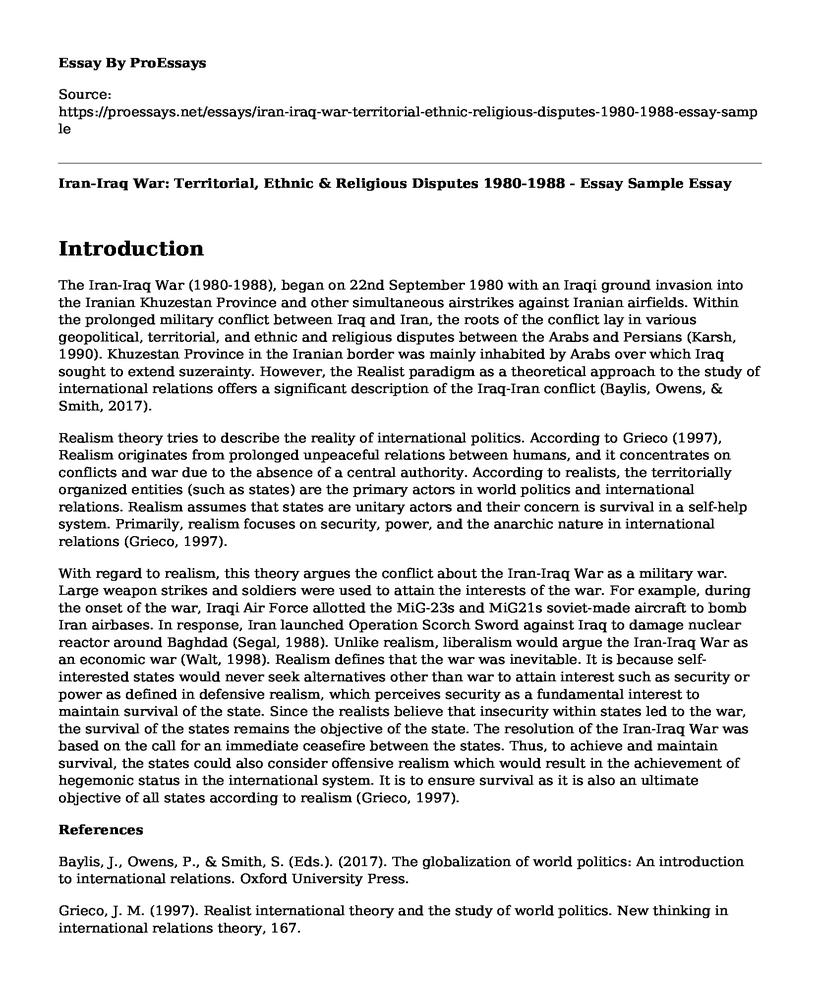Introduction
The Iran-Iraq War (1980-1988), began on 22nd September 1980 with an Iraqi ground invasion into the Iranian Khuzestan Province and other simultaneous airstrikes against Iranian airfields. Within the prolonged military conflict between Iraq and Iran, the roots of the conflict lay in various geopolitical, territorial, and ethnic and religious disputes between the Arabs and Persians (Karsh, 1990). Khuzestan Province in the Iranian border was mainly inhabited by Arabs over which Iraq sought to extend suzerainty. However, the Realist paradigm as a theoretical approach to the study of international relations offers a significant description of the Iraq-Iran conflict (Baylis, Owens, & Smith, 2017).
Realism theory tries to describe the reality of international politics. According to Grieco (1997), Realism originates from prolonged unpeaceful relations between humans, and it concentrates on conflicts and war due to the absence of a central authority. According to realists, the territorially organized entities (such as states) are the primary actors in world politics and international relations. Realism assumes that states are unitary actors and their concern is survival in a self-help system. Primarily, realism focuses on security, power, and the anarchic nature in international relations (Grieco, 1997).
With regard to realism, this theory argues the conflict about the Iran-Iraq War as a military war. Large weapon strikes and soldiers were used to attain the interests of the war. For example, during the onset of the war, Iraqi Air Force allotted the MiG-23s and MiG21s soviet-made aircraft to bomb Iran airbases. In response, Iran launched Operation Scorch Sword against Iraq to damage nuclear reactor around Baghdad (Segal, 1988). Unlike realism, liberalism would argue the Iran-Iraq War as an economic war (Walt, 1998). Realism defines that the war was inevitable. It is because self-interested states would never seek alternatives other than war to attain interest such as security or power as defined in defensive realism, which perceives security as a fundamental interest to maintain survival of the state. Since the realists believe that insecurity within states led to the war, the survival of the states remains the objective of the state. The resolution of the Iran-Iraq War was based on the call for an immediate ceasefire between the states. Thus, to achieve and maintain survival, the states could also consider offensive realism which would result in the achievement of hegemonic status in the international system. It is to ensure survival as it is also an ultimate objective of all states according to realism (Grieco, 1997).
References
Baylis, J., Owens, P., & Smith, S. (Eds.). (2017). The globalization of world politics: An introduction to international relations. Oxford University Press.
Grieco, J. M. (1997). Realist international theory and the study of world politics. New thinking in international relations theory, 167.
Karsh, E. (1990). Geopolitical Determinism: The Origins of the Iran-Iraq War. Middle East Journal, 44(2), 256-268. Retrieved from http://www.jstor.org/stable/4328101
Segal, D. (1988). The Iran-Iraq War: A Military Analysis. Foreign Affairs, 66(5), 946-963. doi:10.2307/20043572
Walt, S. (1998). International Relations: One World, Many Theories. Foreign Policy, (110), 29-46. doi:10.2307/1149275
Cite this page
Iran-Iraq War: Territorial, Ethnic & Religious Disputes 1980-1988 - Essay Sample. (2023, Feb 15). Retrieved from https://proessays.net/essays/iran-iraq-war-territorial-ethnic-religious-disputes-1980-1988-essay-sample
If you are the original author of this essay and no longer wish to have it published on the ProEssays website, please click below to request its removal:
- Essay Sample on the Cherokees Removal
- Slavery and Oppression of the Blacks From 1865 to Present United States
- Essay on Lincoln and Colonization
- Essay Sample on Russian Foreign Policy Motivations in the Ukraine Crisis of 2014
- Terry Fox's Contribution to the Research for Cancer Treatment Paper Example
- Totalitarianism: Hannah Arendt's Insight on Hitler's Rise to Power - Essay Example
- Essay Sample on The Persian and Peloponnesian Wars







